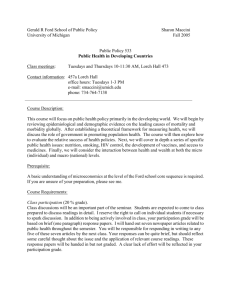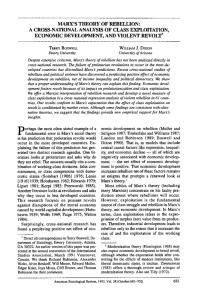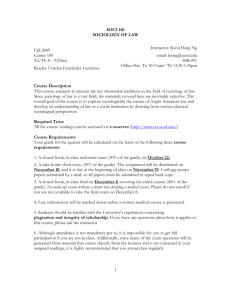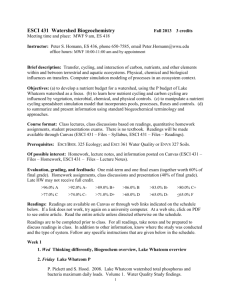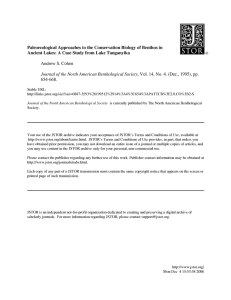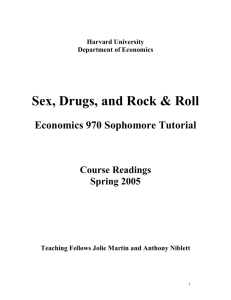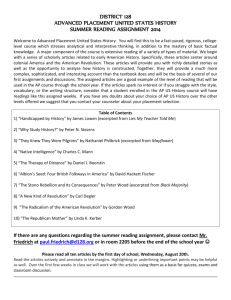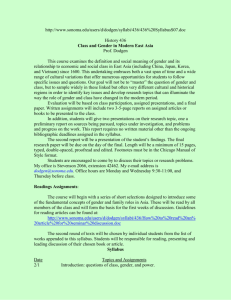political science 132c
advertisement
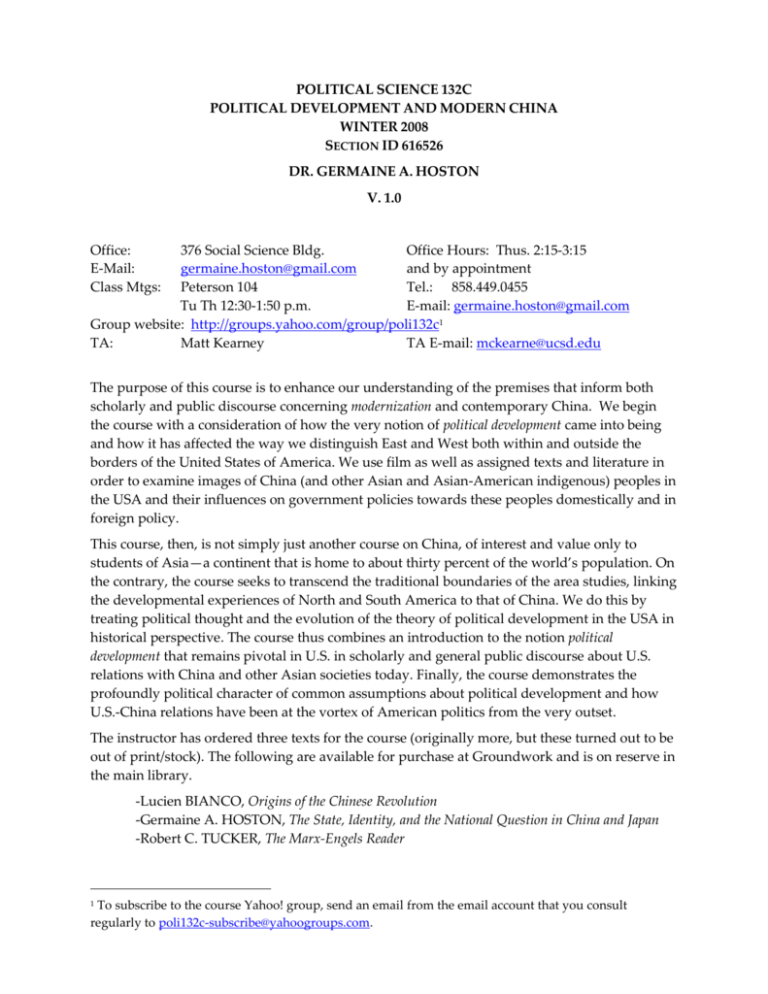
POLITICAL SCIENCE 132C POLITICAL DEVELOPMENT AND MODERN CHINA WINTER 2008 SECTION ID 616526 DR. GERMAINE A. HOSTON V. 1.0 Office: E-Mail: Class Mtgs: 376 Social Science Bldg. Office Hours: Thus. 2:15-3:15 germaine.hoston@gmail.com and by appointment Peterson 104 Tel.: 858.449.0455 Tu Th 12:30-1:50 p.m. E-mail: germaine.hoston@gmail.com Group website: http://groups.yahoo.com/group/poli132c1 TA: Matt Kearney TA E-mail: mckearne@ucsd.edu The purpose of this course is to enhance our understanding of the premises that inform both scholarly and public discourse concerning modernization and contemporary China. We begin the course with a consideration of how the very notion of political development came into being and how it has affected the way we distinguish East and West both within and outside the borders of the United States of America. We use film as well as assigned texts and literature in order to examine images of China (and other Asian and Asian-American indigenous) peoples in the USA and their influences on government policies towards these peoples domestically and in foreign policy. This course, then, is not simply just another course on China, of interest and value only to students of Asia—a continent that is home to about thirty percent of the world’s population. On the contrary, the course seeks to transcend the traditional boundaries of the area studies, linking the developmental experiences of North and South America to that of China. We do this by treating political thought and the evolution of the theory of political development in the USA in historical perspective. The course thus combines an introduction to the notion political development that remains pivotal in U.S. in scholarly and general public discourse about U.S. relations with China and other Asian societies today. Finally, the course demonstrates the profoundly political character of common assumptions about political development and how U.S.-China relations have been at the vortex of American politics from the very outset. The instructor has ordered three texts for the course (originally more, but these turned out to be out of print/stock). The following are available for purchase at Groundwork and is on reserve in the main library. -Lucien BIANCO, Origins of the Chinese Revolution -Germaine A. HOSTON, The State, Identity, and the National Question in China and Japan -Robert C. TUCKER, The Marx-Engels Reader To subscribe to the course Yahoo! group, send an email from the email account that you consult regularly to poli132c-subscribe@yahoogroups.com. 1 PS132C Political Development and Modern China Winter 2008 Dr Germaine A Hoston 2 All other required readings are included in the reader prepared by University Readers Printing Service, which is available for purchase online at http://www.universityreaders.com/students. SCHEDULE OF LECTURES AND READINGS: Week 1 (January 8): Political Development in another Encounter between “East” and “West” Screening of “The West,” Pt. I: “The People,” and Pt. III: “A Speck of the Future,” produced by Ken Burns Required Reading: Lucien Bianco, Origins of the Chinese Revolution (Chapters 1-2) Week 2 (January 15): Economic and Political Development in the U.S. and the Roots of Revolution in China E-Mail assignment due Required Readings: Hahm Chai-bong, “The Ironies of Confucianism,” Journal of Democracy 15.3 (July 2004): 93-107 (e-reserves and link on group site). Stable URL: http://muse.jhu.edu/journals/journal_of_democracy/v015/15.3ham.pdf Bianco, Origins of the Chinese Revolution (remainder) Week 3 (January 22): Revolution and the Historical Roots of the Western Paradigm of Political Development Required Readings: Edward Shils, “Democracy in the New States” (R) Benjamin I. Schwartz, “The Limits of ‘Traditions Versus Modernity as Categories of Explanation” (R) Hoston, The State, Identity, and the National China, chaps 1-2 (R) Wei-ming Tu, "Confucian Traditions in East Asian Modernity: Exploring Moral Authority and Economic Power in Japan and the 4 Mini-Dragons,” Bulletin of the American Academy of Arts and Sciences 46.8 (May 1993): 5-19 (e-reserves and link on group site). Stable URL: http://links.jstor.org/sici?sici=0002712X%28199305%2946%3A8%3C5%3ACTIEAM%3E2.0.C O%3B2-5 Recommended for Graduate Students: G. W. F. Hegel, Philosophy of History, selections Reinhard Bendix, “Tradition and Modernity Reconsidered,” Comparative Studies in Society and History 9.3 (April 1967): 292 -346 Week 4 (January 29): Revolution and Reaction in China: Marx, Lenin, and Modern China Required Readings: PS132C Political Development and Modern China Winter 2008 Dr Germaine A Hoston 3 Marx on the History of His Opinions,” “Contribution to the Critique of Hegel’s Philosophy of Right: An Introduction;” “The Communist Manifesto,” “The German Ideology,” and “On British Imperialism in India,” all in Tucker, Marx-Engels Reader Edward W. Said, “Orientalism” (R) V.I. Lenin, “Imperialism, the Highest Stage of Capitalism,” (R) Recommended: Otto Hintze, “Economics and Politics in the Age of Modern Capitalism,” in The Historical Essays of Otto Hintze, ed. Felix Gilbert (New York: Oxford University Press, 1975), pp. 422-452 Week 5 (Thursday, February 7): In-Class Midterm Examination Immanuel Wallerstein, “A World-System Perspective on the Social Sciences,” The British Journal of Sociology > Vol. 27, No. 3, Special Issue. History and Sociology (Sep., 1976), pp. 343-352. Stable URL: http://links.jstor.org/sici?sici=00071315%28197609%2927%3A3%3C343%3AAWPOTS%3E2.0.CO%3B2-8 Bonilla, “Introduction: Studying Dependency” (R) Lu Xun, “Diary of a Madman” (R) Week 6 (February 12): The Chinese Revolution from Above and Below Required Readings: Takahashi Kōhachirō, “A Contribution to the Discussion” (R) Hoston, The State, Identity, and the National Question, chaps. 3-5 Mao, “On Practice” (group website) Week 7 (February 19): Thought and Practice In the Chinese Revolution Required Readings: Hoston, “Marxism and Japanese Expansionism” (e-reserves and link on group website) Stable URL: http://links.jstor.org/sici?sici=0095- 6848%28198424%2910%3A1%3C1%3AMAJETK%3E2.0.CO%3B2-N Mao, “On New Democracy” (group website) Mao, “Reform Our Study” (group website) Liu Shaoqi, “How to be a Good Communist” (group website) Joseph W. Esherick, “Deconstructing the Construction of the Party-State: Gulin County in the Shaan-Gan-Ning Border Region,” The China Quarterly, No. 140. (Dec., 1994), pp. 1052-1079. Stable URL: http://links.jstor.org/sici?sici=03057410%28199412%290%3A140%3C1052%3ADTCOTP%3E2.0.CO%3B2-9 PS132C Political Development and Modern China Winter 2008 Dr Germaine A Hoston 4 Week 8 (February 26): Theory and Practice in the Chinese Revolution Required Readings: Mark Selden, Yan’an Communism Reconsidered,” Modern China, Vol. 21, No. 1, Symposium: Rethinking the Chinese Revolution. Paradigmatic Issues in Chinese Studies, IV. (Jan., 1995), pp. 8-44. Stable URL: http://links.jstor.org/sici?sici=00977004%28199501%2921%3A1%3C8%3AYCR%3E2.0.CO%3B2-X Hoston, State, Identity, and the National Question, chaps. 7, 9 Shue, “Liberation, Pacification, and Preparation for Village Revolution” (R) Gray, “The Two Roads” (R) Week 9 (March 4): China in Revolution in the Post-Mao Era Required Readings: Shue, Peasant China in Transition (selections) (R) Schwartz, “The Reign of Virtue: Some Broad Perspectives on Leader and Party in the Cultural Revolution” (R) Skinner and Winckler, “Compliance Succession in Rural Communist China” (R) Week 10 (March 11): Transitions and Prospects: A Post-Communist China? Required Readings: Sun, Chinese Reassessment of Socialism, selections (R) Shu-Yun Ma, “The Chinese Discourse on Civil Society,” The China Quarterly, No. 137 (March 1994): 180-193 (e-reserves) Stable URL: http://links.jstor.org/sici?sici=0305- 7410%28199403%290%3A137%3C180%3ATCDOCS%3E2.0.CO%3B2-2 Mary E. Gallagher, “’Reform and Openness’: Why China’s Economic Reforms Have Delayed Democracy,” World Politics 54 (April 2002): 338-372 (e-reserves and link on on group website) URL: http://muse.jhu.edu/journals/world_politics/v054/54.3gallagher.pdf Edward Friedman, “Does China Have the Cultural Preconditions for Democracy?” Philosophy East and West 49.3 (July 1999): 346-359 (e-reserves and link on group site) Stable URL: http://links.jstor.org/sici?sici=00318221%28199907%2949%3A3%3C346%3ADCHTCP%3E2.0.CO%3B2-R REQUIREMENTS AND GRADING: The course is open to both undergraduate and graduate students. Undergraduates will complete an in-class midterm examination of approximately one hour and fifteen minutes, to be held on Thursday, February 7. All students will complete a final examination due on Tuesday, March 18, 2007 11:30 a.m. to 2:30 p.m. The examination will be 10-12 pages (typewritten, double-spaced, with type no smaller than 12 points or 10-pitch) in length. The paper will respond to questions/topics distributed in advance by the instructor. PS132C Political Development and Modern China Winter 2008 Dr Germaine A Hoston 5 Grading Students are expected to complete all assigned required readings. Class attendance and consistent, informed, and productive participation in class discussions is a vital part of an active learning process. This significance is reflected in the grading for the course: For Undergraduate Students: Class Participation: In-Class Midterm: Take-Home Final Examination: 30% 30% 40% For Graduate Students: Graduate students are responsible for doing additional recommended readings, which can be tailored to correspond to individual student research interests. The limited recommended readings on this list are merely a point of departure. Students should consult the professor for additional readings. Participation: 30% Written and Oral Presentations: 70% The expectation is that students will attend all classes. The exception to this is in case of illness. If you are ill, please do not come to class, because this only serves to spread the illness to others. Simply bring a note from your physician to the class following the session that you missed. Students are encouraged to take advantage of the additional opportunities for informal exchange on the subject matter afforded by the Group Site that has been set up for the class. By the second week of class all students must subscribe to the course Yahoo! group by sending an email message from the e-mail address you most consult regularly to poli132csubscribe@yahoogroups.com.
